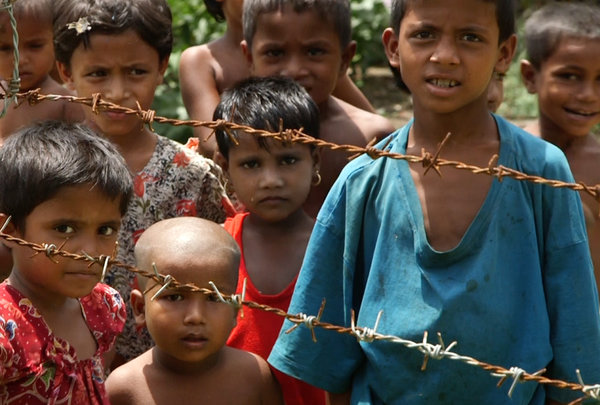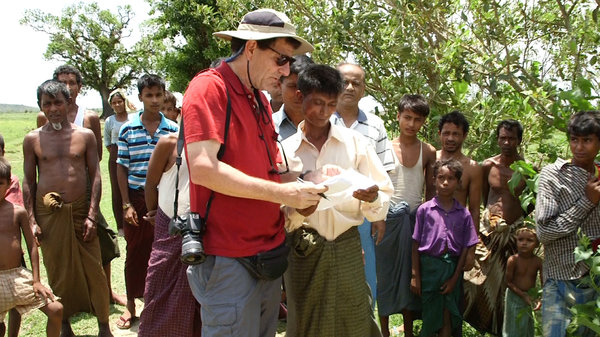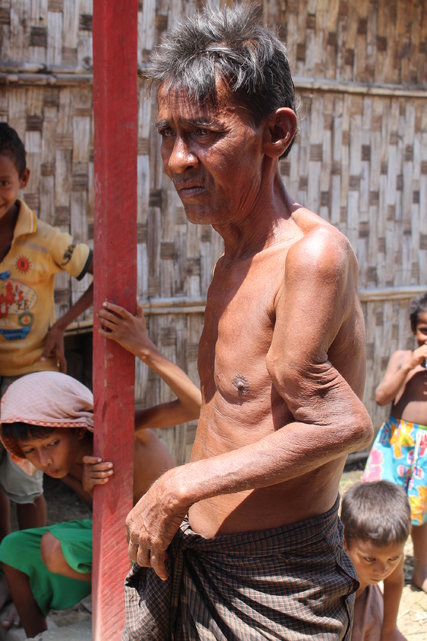My Sunday column, from some remote villages in Myanmar, looks at the ethnic cleansing and crimes agains t humanity being perpetrated against the Rohingya minority there. Some scholars call it genocide, and it arguably does meet the definition in the 1948 convention. But it’s not comparable to the mass murders in Rwanda, Darfur, Armenia or of course the Holocaust, so maybe ethnic cleansing is a better term in this case.
t humanity being perpetrated against the Rohingya minority there. Some scholars call it genocide, and it arguably does meet the definition in the 1948 convention. But it’s not comparable to the mass murders in Rwanda, Darfur, Armenia or of course the Holocaust, so maybe ethnic cleansing is a better term in this case.
Often incidents like this occur in places where we have no leverage–such as a country we’re at war with. In contrast, we have enormous influence with Myanmar; we’re just not using all of it. I grant that this is just one tiny slice of what is happening in that country, and much of what is unfolding is positive. I do wonder about the fairness of highlighting crimes against humanity in one state of the country, when there’s great progress in the country economically, politically and socially. Yet these are the kinds of crimes that merit priority; they shouldn’t be excused because there’s progress in other areas. And, as my column notes, I hope President Obama finds his voice on this issue.
Read the column and share your thoughts.
—————–
Myanmar’s Appalling Apartheid
May 28, 2014
SITTWE, Myanmar — Minura Begum has been in labor for almost 24 hours, and the baby is stuck. Worse, it’s turned around, one tiny foot already emerging into the world in a difficult breech delivery that threatens the lives of mother and child alike.
Twenty-three years old and delivering her first child, Minura desperately needs a doctor. But the Myanmar government has confined her, along with 150,000 others, to a quasi-concentration camp outside town here, and it blocks aid workers from entering to provide medical help. She’s on her own.
Welcome to Myanmar, where tremendous democratic progress is being swamped by crimes against humanity toward the Rohingya, a much-resented Muslim minority in this Buddhist country. Budding democracy seems to aggravate the persecution, for ethnic cleansing of an unpopular minority appears to be a popular vote-getting strategy.
This is my annual “win-a-trip” journey, in which I take a university student on a reporting trip to the developing world. I’m with this year’s winner, Nicole Sganga of Notre Dame University, spotlighting an injustice that some call a genocide.
There are more than one million Rohingya in Rakhine State in the northwest of Myanmar. They are distinct from the local Buddhists both by darker skin and by their Islamic faith. For decades, Myanmar’s military rulers have tried systematically to erase the Rohingya’s existence with oppression, periodic mass expulsions and denials of their identity.
“There are no people called Rohingya in Myanmar,” U Win Myaing, a spokesman for Rakhine State, told me. He said that most are simply illegal immigrants from Bangladesh.
This narrative is absurd, as well as racist. A document as far back as 1799 refers to the Rohingya population here, and an 1826 report estimates that 30 percent of the population of this region was Muslim.
Since clashes in 2012 claimed more than 200 lives — including children hacked with machetes — the authorities have confined Rohingya to internment camps or their own villages. They are stripped of citizenship and cannot freely go to the market, to schools, to university, to hospitals.
Tens of thousands have made desperate attempts to flee by boat, with many drowning along the way.
This year, the Myanmar authorities have cracked down even harder, making the situation worse. First, the government expelled Doctors Without Borders, which had been providing health care for the Rohingya. Then orchestrated mobs attacked the offices of humanitarian organizations, forcing them out.
Some kinds of aid are resuming, but not health care. That’s a sterile way of putting it. I wish readers could see the terrified eyes of Shamshida Begum, 22, a mom whose 1-year-old daughter, Noor, burned with fever.
Shamshida said that at home the thermometer had registered 107 degrees. Even after damp cloths had been placed on Noor to lower her temperature, the thermometer, when I saw it, still read 105 degrees. What kind of a government denies humanitarians from providing medical care to a toddler?
Noor survived, but some don’t. We visited the grief-stricken family of a 35-year-old man named Ba Sein, who died after his tuberculosis went untreated.
“He died because he couldn’t get medicine,” said his widow, Habiba, as friends made a bamboo coffin outside. Now she worries about her four small children who, like other children in the camp, haven’t been vaccinated. The camp is an epidemic waiting to happen.
Minura, the woman with a breech delivery, survived a 28-hour labor and hemorrhaging, but lost her baby. The infant girl was buried in an unmarked grave — one of a large number of achingly small graves on the outskirts of the camp.
“Because I am Rohingya, I cannot get health care and I cannot be a father,” Minura’s husband, Zakir Ahmed, a mason, said bitterly after the burial.
The United States has spoken up, but far too mildly; Europe and Asia have tried to look the other way. We should work in particular with Japan, Britain, Malaysia and the United Nations to pressure Myanmar to restore humanitarian access and medical care.
President Obama, who visited Myanmar and is much admired here, should flatly declare that what is happening here is unconscionable. Obama has lately noted that his foreign policy options are limited, and that military interventions often backfire. True enough, but in Myanmar he has political capital that he has not fully used.
As a university student, Obama denounced apartheid in South Africa. As president, he should stand up to an even more appalling apartheid — one in Myanmar that deprives members of one ethnic group even of health care.
Myanmar seeks American investment and approval. We must make clear that it will get neither unless it treats Rohingya as human beings.
——————
Obama Success or Global Shame?
MRAUK U, Myanmar — AS we hiked on a bamboo bridge over a river, past a police checkpoint, by water buffalo, over abandoned rice paddies, and past a hamlet where 28 Muslim children had been hacked to death, word raced ahead of us. Farmers poured out to welcome us from two besieged villages that for two years have been mostly cut off from the world.
One man, a teacher who spoke a bit of English, thrust a handwritten letter in my hands. Puzzled, I asked him whom he had written the letter for. He explained that he had drafted it in hopes that a foreigner might visit some day and transmit news of the villagers’ suffering.
“Many people are by violent wound died,” the letter recounted in painstaking English. “Now our Rohingyas many people are homeless. We do not have home, food and living very difficulty. Now we are to the cage prison sent.”
The villagers are Rohingya, a dark-skinned Muslim minority that is deeply resented by the Buddhist majority in Myanmar. For decades, Myanmar persecuted the Rohingya and left them stateless, and in the last few months the authorities have amplified the crimes against humanity — yet the global reaction has been largely indifference.
Since violent clashes in 2012, the Rohingya have been confined to quasi-concentration camps or to their villages, denied ready access to markets, jobs or hospitals. This spring, the authorities expelled the aid group Doctors Without Borders, which had been providing the Rohingya with medical care. Orchestrated violent attacks on the offices of humanitarian organizations drove many aid workers away as well and seemed intended in part to remove foreign witnesses to this ethnic cleansing.
I’m on my annual “win-a-trip” journey, in which I take a university student — this year it’s Nicole Sganga of Notre Dame — on a reporting trip (she’s blogging at nytimes.com/ontheground). We wanted to reach remote villages where Rohingya live, where nobody has much idea what is happening, so we set off by vehicle and then by foot.
What we found is dangerous tension and some malnutrition, but by far the biggest problem is medical care. More than one million Rohingya are getting little if any health care, and some are dying as a result.
In the village of Zeezar, we met a young mother, Saida, 20, whose 10-day-old baby was sickly and losing weight. The baby needed a doctor, but aid workers aren’t allowed in the village, and Rohingya aren’t allowed to leave freely.
In theory, Saida can get a pass to go through checkpoints and visit a clinic. In practice, that sometimes means paying bribes and inevitably means passing the homes of people who have been accused of murdering Rohingya with impunity: For her, it’s terrifying. So she gambled that her baby would recover on her own.

In one Rohingya internment camp, we met Thein Maung, 46, who has AIDS and used to get antiretroviral medicines from Doctors Without Borders to keep him alive. Now he has no source of medication, and he feels his health fading.
Another man, Amir Hussein, had his arm broken two years ago by a Buddhist mob. No doctor was available to set the bone, so his left arm now dangles grotesquely and uselessly at an odd angle.
Rohingya children are also denied an education. In one village we visited, parents had set up a free informal school taught by a 17-year-old village girl whose own education had been stalled.
President Obama, in his address a few days ago at the United States Military Academy at West Point, cited Myanmar as one of the administration’s diplomatic successes. It’s true that Myanmar has made tremendous political gains in recent years — the permission I received to report here is testimony to that — and there is much to admire about the country’s progress toward democracy. But let’s not make excuses for a 21st-century apartheid worse even than the system once enforced in South Africa. As Human Rights Watch has documented, what has unfolded here constitutes ethnic cleansing and crimes against humanity.
Likewise, another watchdog group, Fortify Rights, cites internal Myanmar documents and argues that a pattern over the years of killings, torture, rape and other repression amounts to crimes against humanity under international law.

Weighed against such abuses, Obama’s criticisms of Myanmar have been pathetically timid. Because he is hugely admired here, Obama has political capital to pressure the government that he has not used. Indeed, the United States and other countries have often even avoided the word Rohingya, effectively joining in the denial of a people’s identity. That’s a failed policy, for this deference has led Myanmar to tighten the screws on the Rohingya this year.
The Rohingya gave us the names of some Buddhists who they said had been leaders in slaughtering Muslims, and we visited one of these men they named. A 53-year-old farmer, he denied any involvement in the violence, but it was an awkward, tense conversation, partly because the Buddhists are angry at aid groups and journalists for (as they see it) siding with Muslims. Their narrative is that Muslim terrorists from Bangladesh are invading the country, overpopulating so as to marginalize the Buddhists, and then being coddled by foreigners.
The extremists back up this absurd narrative with intimidation. My Buddhist driver, who sported a nationalist tattoo, was willing to take me into Rohingya camps and villages and had no fear of assault by Muslims. But he was terrified of going to some hard-line Buddhist areas, for fear that we would be assaulted as Muslim sympathizers.
When the authorities found out that we were wandering in the hills, they sent a team of police officers armed with automatic weapons to find and “protect” us. They need to start protecting the Rohingya as well.
Look, I’ve seen greater malnutrition and disease over the years — in South Sudan, Niger, Congo, Guinea — but what’s odious about what is happening here is that the suffering is deliberately inflicted as government policy. The authorities are stripping members of one ethnic group of citizenship, then interning them in camps or villages, depriving them of education, refusing them medical care — and even expelling humanitarians who seek to save their lives.
That’s not a tragedy for one obscure ethnic group; it’s an affront to civilization. Please, President Obama, find your voice.